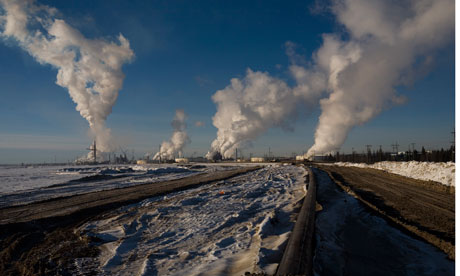Oil from controversial and environmentally destructive tar sands is likely to be all but banned from Europe after a decision on Tuesday. The move also casts doubt on the future of other controversial energy sources such as shale gas.
Tar sands (also known as oil sands) have been a target of green campaigners for several years, as the extraction of low quality oil from sands – chiefly in Canada to date – produces far greater greenhouse gas emissions than conventional oil drilling operations, and requires vast quantities of water. The exploitation of tar sands has also led to the destruction of swaths of forest and is blamed for water and air pollution.
In a victory for Connie Hedegaard, the EU's climate change commissioner, the commission has decided to back a new directive on fuel quality. This will set minimum environmental standards for a range of fuels, including tar sands, coal converted to liquid and oil from shale rock.
Hedegaard said: "With this measure, we are sending a clear signal to fossil fuels suppliers. As fossil fuels will be a reality in the foreseeable future, it's important to give them the right value.''
Franziska Achterberg, EU transport policy adviser for Greenpeace, said: "Today's move by the commission is good news. Tar sands extraction is a very dirty business for the climate, polluting rivers, lacing the air with toxins and turning forests into wasteland. Despite coming under intense pressure from oil lobbyists and Canada, the commission is doing the right thing by wanting to keep tar sands out of Europe to protect the climate."
The proposals have now been sent to EU member states who will meet in four to six weeks to vote on the proposal. It will then go to the European parliament for final approval.
If the proposed standards are accepted, they will all but rule out imports of tar sands, unless producers can clean up their acts. The commission has proposed that tar sands be ascribed a greenhouse gas value of 107 grams per megajoule of fuel – this compares with 87.5 grams per megajoule for ordinary crude oil, on average. Producers will also have to cut the carbon footprint of their fuels by 6% in the next decade.
Although gas from shale is not yet included, because the proposed directive is focused on transport fuels, the acceptance that fuels must meet minimum environmental standards makes it much more likely that it too could fall foul of legislation in the future. Shale gas has come under the spotlight as vast sources in the US have proved a cheap source of fuel there, but allegations of widespread pollution caused by the shale gas projects has led green groups to call for a moratorium. Europe is beginning to exploit its own newly discovered reserves, but campaigners have called for a halt while the environmental consequences are studied. In the UK, drilling work has begun at sites in Lancashire.
The proposed fuel quality directive may also face a tough ride from some member states. In Britain, Norman Baker, minister for transport, stated in a letter dated 26 September that the government will oppose inclusion of a tar sands value and will "continue to have discussions with colleagues in other member states to ensure all heavy crudes are dealt with, not simply oil sands".
The commission appears to have finessed this objection by including other fuels – such as coal converted to liquid and oil from shale, both of which have been assigned far higher carbon values than oil from tar sands – but it is not certain ministers will accept this. There has been fierce lobbying from the Canadian government in particular over the past year on this issue.
Canada has warned that banning oil from tar sands will raise energy prices for Europe, as tar sands are probably the world's biggest reserve of oil after Saudi Arabia. The exploitation of the hard-to-reach resources is only economically viable because of the high oil price.
Paul Morozzo from Greenpeace UK said the benefits of ruling out tar sands and other high-carbon fuel sources were clear: "This proposal is absolutely the right recommendation. The key question now is what will the UK government do – will it be, as David Cameron once claimed, the greenest government ever and support the ban or will the government adopt the George Osborne approach, as outlined in his speech [at the Conservative party conference], where carbon emissions and the destruction of the environment seems to be a price worth paying."

